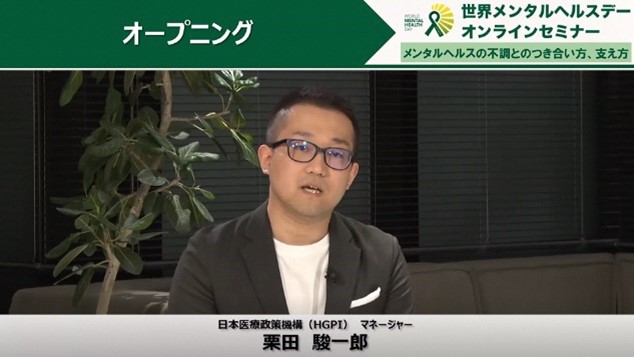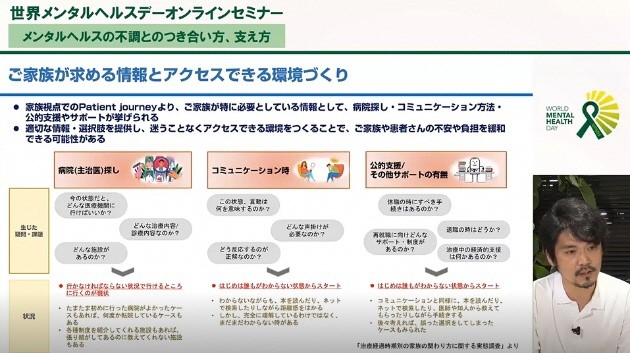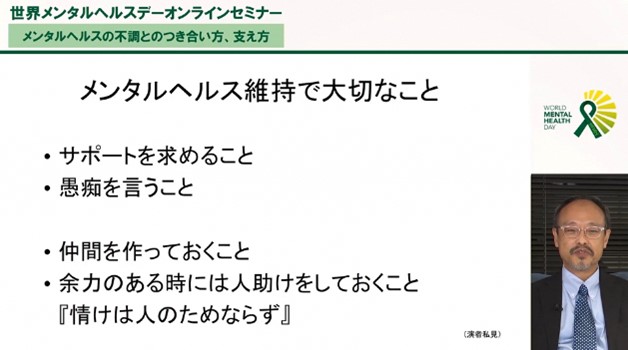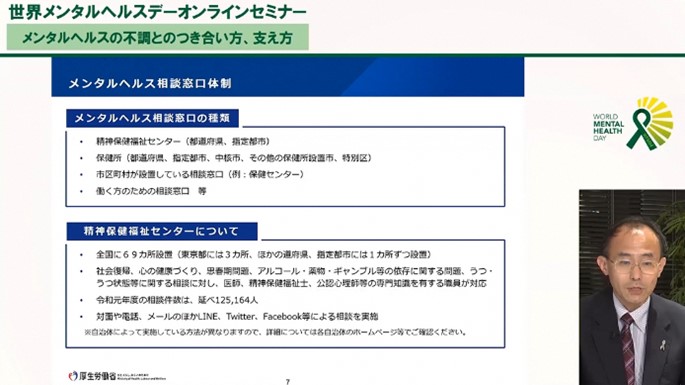[Event Report] (Webinar) World Mental Health Day Seminar – How to Cope With and Help Others Handle Mental Health Stress (October 7, 2021)
date : 11/16/2021
Tags: Mental Health
![[Event Report] (Webinar) World Mental Health Day Seminar – How to Cope With and Help Others Handle Mental Health Stress (October 7, 2021)](https://hgpi.org/en/wp-content/uploads/sites/2/mh-20211007-top1-1.jpg)
To commemorate World Mental Health Day, which fell on October 10, 2021 and is a day for people around the world to think about mental health issues, Beta Trip Co. Ltd., Lundbeck Japan K.K., and Health and Global Policy Institute (HGPI) jointly hosted an online seminar for the general public under the theme “How to Cope With and Help Others Handle Mental Health Stress.”
The seminar was held on October 7, 2021 and included talks from a person representing those living with mental disorders, a physician specializing in mental health, and a representative from the Ministry of Health, Labour and Welfare (MHLW). They shared stories of firsthand experiences from people with mental disorders and their families, knowledge on how to provide self-care and consult a physician when one has developed a mental health-related issue, and information on how to effectively utilize mental health support systems, including social resources.
During the opening speech, HGPI Manager Mr. Shunichiro Kurita introduced the history of World Mental Health Day, explaining that it was started by the World Federation for Mental Health about 30 years ago to build awareness toward mental health and eliminate prejudice across the globe. He also described the purpose of the seminar, which was to mark the occasion of World Mental Health Day by helping to build societal understanding that everyone can be affected by mental health problems, either personally or through those around them, and that we must be ready for sudden issues that may adversely affect our mental health.
Mr. Shingo Hayashi (Representative and Administrator, Community Site for People with Depression and Their Families encourage) shared his personal experiences with a mental disorder from onset to recovery. He spoke about some of the key points of recovery, such as the great significance of those around him who stayed at his side and waited eagerly for his recovery. Sharing a survey of family members of people with mental disorders, he said that families, as the parties who most closely support people with mental disorders, also face challenges throughout the treatment process. He also shared that there are cases in which these family members suffer alone for lack of access to appropriate information. Mr. Hayashi pointed out that developing an environment in which families can readily access the information they need can ease anxiety and lighten the burdens faced by people with mental disorders and their families. This information includes how to find healthcare facilities, how to approach communication, and how to get public assistance and support.
Professor Yoshinori Cho (Director, Rokubancho Mental Clinic, Japan Depression Center and Visiting Professor, Department of Psychiatry, School of Medicine, Teikyo University Mizonokuchi Hospital) talked about helping people correctly understand poor mental health, how one can interact with surrounding people during times of mental health stress, the definition of mental health, points to recognize, and first aid. Professor Cho shared specific items of note for early detection, stating that if someone feels mentally unwell for one month, it is a good sign they should consider visiting a psychiatrist or mental health clinic. He also said that the key to maintaining good mental health is to not only ask for support or to complain, but to also build relationships in which people can help one another regularly so they can be prepared for mental health stress.
Mr. Nobuyuki Kazama (Director, Mental Health Support Office, Mental Health and Disability Health Division, Department of Health and Welfare for Persons with Disabilities, Social Welfare and War Victims’ Relief Bureau, MHLW) explained that the support system for mental health stress includes mental health consultation centers such as mental health and welfare centers and public health centers, that these centers have been established in cities and communities close to those who need them, and that they provide easy access to consultation for people with mental disorders and their families. He also explained the mental health policies that support daily life in Japan, such as the Integrated Community Care System for Mental Disorders and an initiative aimed at helping create it, the Mental Health Supporter Training Project. Mr. Kazama also introduced the Government’s efforts to promote World Mental Health Day and raise awareness toward mental health, which included a light up event.
Each speaker also shared personal views on each of four themes during the panel discussion.
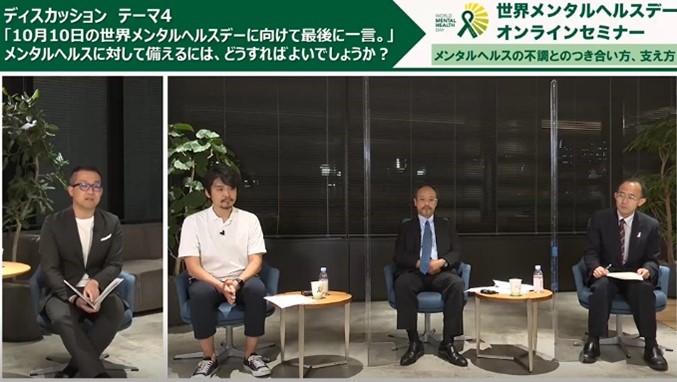
Expectations for the Mental Health Supporter system:
Mr. Kazama said that training Mental Health Supporters will promote correct knowledge and understanding toward mental health and mental illness in communities, which will advance integrated community care as a result. He also invited members of the audience to participate in upcoming training seminars. Mr. Hayashi said that he hopes correct knowledge and better listening skills will take root so people will start opening up about mental health without hesitation in everyday conversations. Professor Cho expressed high expectations that the Mental Health Supporters Training Program led by the MHLW will create opportunities for everyone to come to recognize mental health as a personal matter by expanding correct knowledge and understanding toward mental health throughout society. He also said that the program will make it easier for people to notice when something is wrong and call out for help on their own, as well as make it easier for those around them to approach them.
On first options available when people feel mental distress:
Pointing out the importance of not waiting too long, Professor Cho urged people to consider visiting a healthcare institution as soon as possible if they have qualitative abnormalities. He also advised those who experience quantitative abnormalities that persist for a month to seek help from a specialist. Reflecting on his own experiences, Mr. Hayashi stated it is important to not wait too long and consult with someone who is close and trusted as soon as possible when one feels mentally unwell. Mr. Kazama mentioned the importance of rapid response and that people can seek consultations from mental health and welfare centers and public health centers in addition to healthcare institutions. He also encouraged the audience to check local government websites to see what specific consultation services are available.
Expectations for online tools and smartphone apps to support better mental health:
Mr. Hayashi mentioned that he sometimes uses an app himself, out of convenience. He also expressed hope for app utilization to be further expanded and that apps become tools for connecting with specialists and other stakeholders for better mental health in healthcare institutions and at workplaces. Professor Cho said that physical distancing practices can make people feel alienated, but that it may be possible to use digital tools to prevent physical distancing from also becoming psychological distancing. He said that it would be good if people pick tools that fit their needs and that they can keep using on a continuous basis. Mr. Kazama stated that online tools and smartphone apps can be effective, especially for younger people, and explained that the MHLW “Let’s Take Care of Our Mental Health” website introduces organizations that provide consultation services over social networking sites or online chat tools.
Personal messages for World Mental Health Day on October 10, and responses to the question, “How can we be prepared for mental health challenges?” :
Pointing out that one in five people will at some point experience a mental health problem, Mr. Kazama highlighted that it is an issue everyone has experience with. He urged everyone experiencing mental health distress to talk to someone close to them and to call out if they see a friend or colleague who is not acting their normal self. Reflecting on World Mental Health Day’s original purpose of eradicating stigma, Professor Cho said it is important to create a community in which people can open up about mental health in daily life, where people view mental health as something that affects them rather than as something that only affects others, where the topic of mental health is not considered taboo, and where people experiencing mental health issues can easily speak up and ask for help. Mr. Hayashi expressed hope that World Mental Health Day will be an opportunity for people to come to understand mental health problems better, that it becomes easier for people to speak up when they are suffering, and that support can be provided to people in distress, their families, and the people around them. He also stated that he would like to play a role in making these hopes a reality.
HGPI Manager Mr. Shunichiro Kurita explained that World Mental Health Day is an opportunity to propagate understanding throughout all of society that anyone, whether personally or through those around them, can find themselves facing challenges related to mental health. He closed the event stating that he wants people to know they must be prepared in the event they experience a sudden mental health problem.
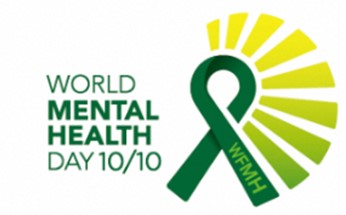
World Mental Health Day Online Seminar – How to Cope With and Help Others Handle Mental Health Stress
[Event overview]
Date and time: Thursday, October 7, 2021; 19:00 to 20:30 JST
Format: Online seminar over Zoom
Participation and attendees: Free; open to the general public (380 attendees registered)
Hosted by: HGPI, Beta Trip Co. Ltd., and Lundbeck Japan K.K.
With support from: The National Federation of Associations of Families with The Mental Illness in Japan (Minna-net), COmmunity Mental Health & welfare Bonding Organization (COMHBO), the Royal Danish Embassy, the Japan Depression Center (JDC), and the Institute of Japan Mental-health Peer-support training.
[Program]
19:00-19:05 Opening remarks
Shunichiro Kurita (Manager, HGPI)
19:05-19:25 “Firsthand Experiences with Mental Health Issues and the Need for Family Support”
Shingo Hayashi (Representative and Administrator, Community Site for People with Depression and Their Families encourage)
19:25-19:45 “Correctly Understanding Mental Health Problems and How to Approach Others – Points of Note and Providing First Aid”
Yoshinori Cho (Director, Rokubancho Mental Clinic, Japan Depression Center; Visiting Professor, Department of Psychiatry, School of Medicine, Teikyo University Mizonokuchi Hospital)
19:45-20:05 “Japan’s Support System for Responding to Mental Health Issues”
Nobuyuki Kazama (Director, Mental Health Support Office, Mental Health and Disability Health Division, Department of Health and Welfare for Persons with Disabilities, Social Welfare and War Victims’ Relief Bureau, MHLW)
20:05-20:30 Discussion
Top Research & Recommendations Posts
- [Policy Recommendations] The Path to a Sustainable Healthcare System: Three Key Objectives for Public Deliberation (January 22, 2026)
- [Research Report] Perceptions, Knowledge, Actions and Perspectives of Healthcare Organizations in Japan in Relation to Climate Change and Health: A Cross-Sectional Study (November 13, 2025)
- [Research Report] The 2025 Public Opinion Survey on Healthcare in Japan (March 17, 2025)
- [Policy Recommendations] Reshaping Japan’s Immunization Policy for Life Course Coverage and Vaccine Equity: Challenges and Prospects for an Era of Prevention and Health Promotion (April 25, 2025)
- [Research Report] The 2023 Public Opinion Survey on Satisfaction in Healthcare in Japan and Healthcare Applications of Generative AI (January 11, 2024)
- [Research Report] AMR Policy Update #4: Cancer Care and AMR (Part 1)
- [Policy Recommendations] Developing a National Health and Climate Strategy for Japan (June 26, 2024)
- [Public Comment Submission] “Assessment Report on Climate Change Impacts in Japan (Draft Overview)” (December 24, 2025)
- [Research Report] Survey of Japanese Physicians Regarding Climate Change and Health (December 3, 2023)
- [Research Report] The Public Opinion Survey on Child-Rearing in Modern Japan (Final Report) (March 4, 2022)
Featured Posts
-
2026-01-09
[Registration Open] (Hybrid Format) Dementia Project FY2025 Initiative Concluding Symposium “The Future of Dementia Policy Surrounding Families and Others Who Care for People with Dementia” (March 9, 2026)
![[Registration Open] (Hybrid Format) Dementia Project FY2025 Initiative Concluding Symposium “The Future of Dementia Policy Surrounding Families and Others Who Care for People with Dementia” (March 9, 2026)](https://hgpi.org/en/wp-content/uploads/sites/2/dementia-20260309-top.png)
-
2026-02-05
[Registration Open] (Webinar) The 141st HGPI Seminar “Current Status and Future Prospects of Korea’s Obesity Policy: Voices of People with Lived Experience in Policy Promotion” (March 3, 2026)
![[Registration Open] (Webinar) The 141st HGPI Seminar “Current Status and Future Prospects of Korea’s Obesity Policy: Voices of People with Lived Experience in Policy Promotion” (March 3, 2026)](https://hgpi.org/en/wp-content/uploads/sites/2/hs141-top-1.png)
-
2026-02-06
[Research Report] AMR Policy Update #5: Cancer Care and AMR (Part 2)
![[Research Report] AMR Policy Update #5: Cancer Care and AMR (Part 2)](https://hgpi.org/en/wp-content/uploads/sites/2/HGPI_20260204_AMR-Policy-Update-5.png)




